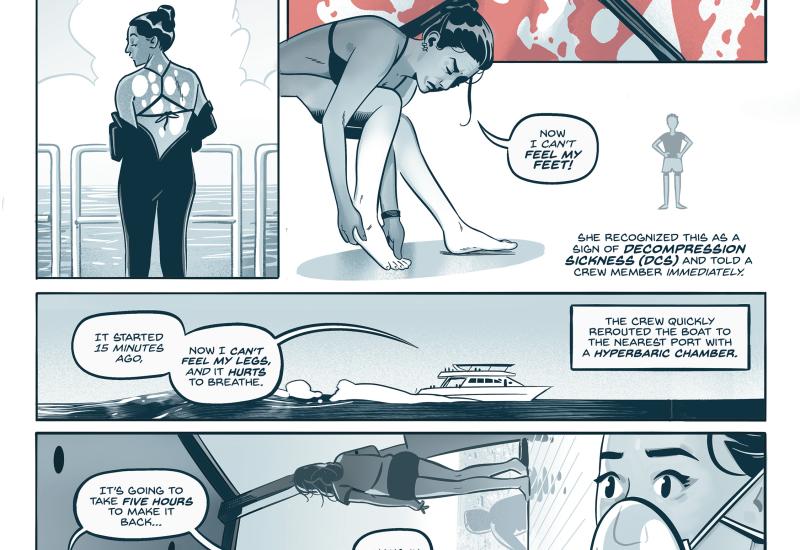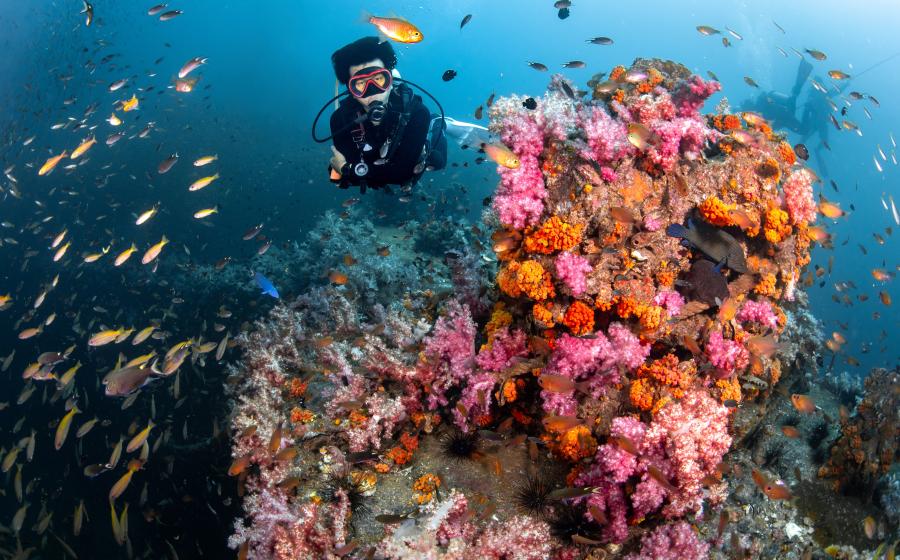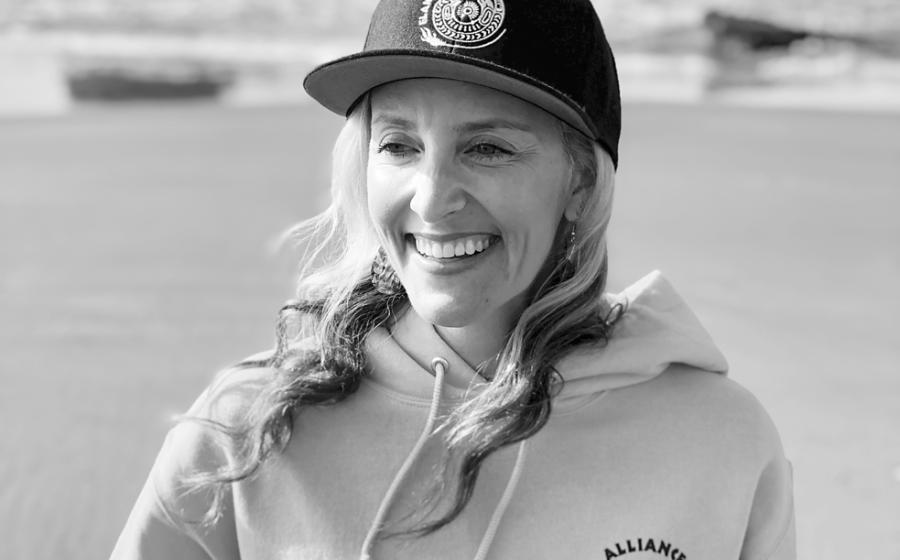A Bad Bargain
The deafening roar of escaping air assaulted Dan's ears as he struggled to breathe from the violently free-flowing regulator. In spite of the cascade of air, every breath was filled with water and he had to inhale cautiously just to avoid choking. To make matters worse, he couldn't see past the curtain of bubbles boiling upward and had no way to signal his buddies for help. Fighting back panic, he stole a look at his pressure gauge. The needle was steadily winding its way toward zero, and he already had less than 500 psi left in his tank. Unable to control his fear any longer, Dan bolted toward the surface.
The Divers
Joy and Al were active recreational divers who convinced their friend Dan to earn his C-card and join them on their frequent dive vacations. Certified for less than a year, Dan was still accumulating his gear and as they left for a weekend island getaway, he proudly showed off his latest acquisition-a high-end regulator still in the box. Dan had purchased it at a huge savings from a web site selling discount dive equipment.
The Dive
When the divers arrived on-island, Dan borrowed some tools in order to attach an octopus and pressure gauge to his new regulator. The divers entered the water as a three-man buddy team and descended to the reef 60 feet below. The sight of a black-tip shark in the distance enthralled Dan, and when he turned back to his buddies, he noticed that they were far ahead of him. Dan dropped the last few feet to the bottom and swam quickly to catch them.
The Accident
Dan was breathing hard on his regulator when he heard a distinctive pop behind his head, followed by a deafening roar as air began to gush from his mouthpiece. There were bubbles everywhere and the free-flowing regulator was shooting air-and a generous amount of water-into Dan's mouth. Struggling not to choke, Dan looked for Joy and Al, but could see little beyond the curtain of bubbles.
As his anxiety grew, Dan's ability to deal rationally with the problem began to decay. At some point, it dawned on him that he was wasting too much time and losing air way too fast. He pulled his pressure gauge directly in front of his mask and was stunned to see his tank was nearly empty. Seized by panic, he began swimming rapidly for the surface.
The Rescue
Dan surfaced, screaming for help and struggling to stay afloat. The boat captain yelled for Dan to inflate his BC and drop his weight belt as the mate dived in and swam rapidly to the panicked diver. Grabbing Dan just as he began to sink below the surface, the mate managed to add a small quantity of air to the BC and released Dan's weight belt.
Dan was in full-scale panic, but thanks to the mate's quick action, he was no longer in danger of drowning. The mate backed away, letting Dan exhaust himself while calmly issuing reassuring commands. Slowly, Dan's panic began to recede and he dropped into a state of exhaustion, allowing the mate to safely approach and tow him back to the boat. Though shaken, Dan escaped without harm.
Analysis
As with many dive accidents, this one was set in motion long before the divers entered the water. In this case, the problem began when Dan clicked the purchase button on a web site offering "brand-new, out-of-the-box equipment" at "big savings."
Dan was very proud of his internet shopping savvy, but he failed to recognize the importance of making sure his life-support equipment was properly inspected by a qualified technician. Manufacturers produce tens of thousands of regulators each year and some will have problems. This is why dive stores are required by their dealer agreements to inspect and test each regulator before delivery to a customer. Some internet and discount venues-including the one where Dan found his great deal-do not offer these inspection services.
An inspection of Dan's regulator immediately following the accident revealed several issues. First, there were metal shavings inside the regulator's first stage, apparently left over from the manufacturing process. Under pressure, these shavings cut into the seat material causing the first stage to fail and creating the violent free flow. The technician also found a loose port plug on the regulator. The O-ring on the plug was extruded, probably as a result of the high-pressure seat failure, and was the apparent source of the water Dan inhaled during the free flow. It is unclear whether the plug was left loose in assembly or whether Dan loosened it by mistake when he attached the additional hoses. Either way, a proper inspection would have identified all of these problems and prevented this accident.
Once the accident began, Dan's buddies were nowhere near and never realized the problem until they surfaced at the end of the dive. This is a clear example of how three-man buddy teams provide only the illusion of safety unless all members of the team recognize their responsibilities.
Even with these mistakes, Dan's accident was still not life-threatening until panic took over. He had ample time and air to make a slow controlled ascent, and that is precisely what he should have done as soon as it was apparent that his buddies were unavailable. At the surface, Dan compounded his problems when he failed to get positively buoyant. Dumping his weights and inflating his BC would have helped control his panic.
Lessons for Life
-
Be frugal-not stupid. When comparing bargain-priced equipment to the gear for sale at a reputable local dive store, add the cost of setup and service to the cost of the bargain. Either way you buy, be sure a technician checks your equipment.
-
Three is a crowd. Whenever possible, only dive in two-man buddy teams. If you must dive as a buddy trio, assign specific obligations to each diver.
-
When in distress, surface-slowly and deliberately before you have to do it without control.
-
Get positive. Dump your weights and inflate your BC as soon as you have reached the surface, or even sooner if you feel you can't make it there. It doesn't hurt to practice this skill in controlled conditions before you have to do it for real.
The deafening roar of escaping air assaulted Dan's ears as he struggled to breathe from the violently free-flowing regulator. In spite of the cascade of air, every breath was filled with water and he had to inhale cautiously just to avoid choking. To make matters worse, he couldn't see past the curtain of bubbles boiling upward and had no way to signal his buddies for help. Fighting back panic, he stole a look at his pressure gauge. The needle was steadily winding its way toward zero, and he already had less than 500 psi left in his tank. Unable to control his fear any longer, Dan bolted toward the surface.
The Divers
Joy and Al were active recreational divers who convinced their friend Dan to earn his C-card and join them on their frequent dive vacations. Certified for less than a year, Dan was still accumulating his gear and as they left for a weekend island getaway, he proudly showed off his latest acquisition-a high-end regulator still in the box. Dan had purchased it at a huge savings from a web site selling discount dive equipment.
The Dive
When the divers arrived on-island, Dan borrowed some tools in order to attach an octopus and pressure gauge to his new regulator. The divers entered the water as a three-man buddy team and descended to the reef 60 feet below. The sight of a black-tip shark in the distance enthralled Dan, and when he turned back to his buddies, he noticed that they were far ahead of him. Dan dropped the last few feet to the bottom and swam quickly to catch them.
The Accident
Dan was breathing hard on his regulator when he heard a distinctive pop behind his head, followed by a deafening roar as air began to gush from his mouthpiece. There were bubbles everywhere and the free-flowing regulator was shooting air-and a generous amount of water-into Dan's mouth. Struggling not to choke, Dan looked for Joy and Al, but could see little beyond the curtain of bubbles.
As his anxiety grew, Dan's ability to deal rationally with the problem began to decay. At some point, it dawned on him that he was wasting too much time and losing air way too fast. He pulled his pressure gauge directly in front of his mask and was stunned to see his tank was nearly empty. Seized by panic, he began swimming rapidly for the surface.
The Rescue
Dan surfaced, screaming for help and struggling to stay afloat. The boat captain yelled for Dan to inflate his BC and drop his weight belt as the mate dived in and swam rapidly to the panicked diver. Grabbing Dan just as he began to sink below the surface, the mate managed to add a small quantity of air to the BC and released Dan's weight belt.
Dan was in full-scale panic, but thanks to the mate's quick action, he was no longer in danger of drowning. The mate backed away, letting Dan exhaust himself while calmly issuing reassuring commands. Slowly, Dan's panic began to recede and he dropped into a state of exhaustion, allowing the mate to safely approach and tow him back to the boat. Though shaken, Dan escaped without harm.
Analysis
As with many dive accidents, this one was set in motion long before the divers entered the water. In this case, the problem began when Dan clicked the purchase button on a web site offering "brand-new, out-of-the-box equipment" at "big savings."
Dan was very proud of his internet shopping savvy, but he failed to recognize the importance of making sure his life-support equipment was properly inspected by a qualified technician. Manufacturers produce tens of thousands of regulators each year and some will have problems. This is why dive stores are required by their dealer agreements to inspect and test each regulator before delivery to a customer. Some internet and discount venues-including the one where Dan found his great deal-do not offer these inspection services.
An inspection of Dan's regulator immediately following the accident revealed several issues. First, there were metal shavings inside the regulator's first stage, apparently left over from the manufacturing process. Under pressure, these shavings cut into the seat material causing the first stage to fail and creating the violent free flow. The technician also found a loose port plug on the regulator. The O-ring on the plug was extruded, probably as a result of the high-pressure seat failure, and was the apparent source of the water Dan inhaled during the free flow. It is unclear whether the plug was left loose in assembly or whether Dan loosened it by mistake when he attached the additional hoses. Either way, a proper inspection would have identified all of these problems and prevented this accident.
Once the accident began, Dan's buddies were nowhere near and never realized the problem until they surfaced at the end of the dive. This is a clear example of how three-man buddy teams provide only the illusion of safety unless all members of the team recognize their responsibilities.
Even with these mistakes, Dan's accident was still not life-threatening until panic took over. He had ample time and air to make a slow controlled ascent, and that is precisely what he should have done as soon as it was apparent that his buddies were unavailable. At the surface, Dan compounded his problems when he failed to get positively buoyant. Dumping his weights and inflating his BC would have helped control his panic.
Lessons for Life
Be frugal-not stupid. When comparing bargain-priced equipment to the gear for sale at a reputable local dive store, add the cost of setup and service to the cost of the bargain. Either way you buy, be sure a technician checks your equipment.
Three is a crowd. Whenever possible, only dive in two-man buddy teams. If you must dive as a buddy trio, assign specific obligations to each diver.
When in distress, surface-slowly and deliberately before you have to do it without control.
Get positive. Dump your weights and inflate your BC as soon as you have reached the surface, or even sooner if you feel you can't make it there. It doesn't hurt to practice this skill in controlled conditions before you have to do it for real.










